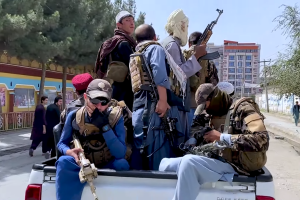August 15 holds a solemn place in the collective memory of the Afghan people as a symbol of state collapse, the onset of darkness, and the failure of the international conscience. On this day, a fundamentalist, misogynistic, and anti-human group used force to reassert its control over the fate of a nation. This moment marks one of the darkest chapters in contemporary Afghan history. It was not only a political collapse but the destruction of half a century of women’s struggle for freedom, equality, and human dignity – a disintegration of core human rights and values.
The Taliban, a group born out of regional and international intelligence projects, assumed power on August 15, 2021 through the humiliating surrender of Kabul. As with the group’s origin, the Taliban’s return to power was sealed by agreements among global powers, rather than the Afghan people’s will.
The result was the total erasure of Afghan women, who are not only denied education, political participation, and civil engagement but stripped of the basic right to exist in society. The Taliban formally and completely deny the social and individual presence of Afghan women.
United Nations reports, including those by Richard Bennett, the U.N. special rapporteur on human rights in Afghanistan, have documented systematic, organized violence against women: arbitrary arrests, imprisonment, torture, gang rape, forced marriages, and targeted killings are all weapons in the deliberate silencing of Afghan women.
The Taliban’s hostility toward education, especially women’s education, is neither accidental nor superficial; it is a fundamental pillar of their ideology. Since their inception, the Taliban have viewed education not as a human right but as a threat to their political, ethnic, and religious dominance.
An educated woman is one who reads history, understands her rights, knows laws and international agreements, raises her voice, and refuses silence in the face of injustice. To the Taliban, this is unacceptable. Therefore, the systematic and total exclusion of women from schools and universities is not merely political but part of a broader project to remove the active, critical, and aware woman from society’s fabric.
This policy is deeply rooted in the Taliban’s primitive, patriarchal interpretation of Islam, entwined with tribal culture and ignorance. In this view, women are not equal partners in life and society but property and sources of “fitna” (discord). Hence, they must be confined to the home, kept in ignorance, and relegated to reproductive and servile roles.
More importantly, excluding women from education is not only a goal itself but a means to produce a generation that is purposefully kept ignorant and obedient, deprived of tools for critique and change. Children born to illiterate mothers face a bleak future. The Taliban, aware of this fact, are advancing a “generation destruction” plan by excluding women from education and public life.
Banning girls’ education, closing schools and universities, firing female teachers, and threatening families who send children to school are one side of the coin; the other side is replacing curricula for schools that still exist with extremist content. This is a calculated scheme to stifle awareness and expand ignorance and extremism in Afghanistan and the region. Ignorance is the foundation of Taliban power; knowledge is its end.
More shocking than Afghanistan’s fall has been the shameful silence – and even disgraceful complicity – of the international community in the face of the Taliban’s egregious abuses. Countries claiming to defend freedom and human rights today are moving to normalize relations with a group that commits crimes against humanity.
Russia, Germany, China, and other global powers engage with the Taliban as if forgetting that the Taliban exclude women from society, ban girls from education, and suppress critics. This policy not only legitimizes violence and reactionism but erodes the moral foundations of a global order based on human rights. Today, human rights have become a selective political tool, not a universal principle.
While politicians fled and global institutions watched, Afghan women stood firm. With bare hands and no support, facing a machine of violence and terror, they marched in the streets, shouted, wrote, protested, were arrested, tortured, and killed – but never silenced. This resistance is not only about education and employment but a comprehensive fight to preserve human dignity, social existence, and the voice of future generations.
Despite all the cries, resistances, and sacrifices by Afghan women, the bitter question remains: Why do global institutions not hear us? Why do the United Nations, the European Union, and countries professing freedom and human rights fail to provide real, practical support to Afghan women’s resistance? Is our victimhood insufficiently strategic? Is our pain politically unprofitable?
August 15, 2021, marked not only the fall of a government but a historical moment of moral failure – the collapse of human values and the principles the international community long claimed to uphold. On this day, not just Afghanistan, but humanity’s trust in the promises of the free world was broken.
This history reminds us all how nations become victims of geopolitical interests; how women, children, and intellectuals are silently erased in a puzzle of security deals; and how human rights bodies, meant to be the voice of the oppressed, remain inert at critical junctures.
In a world where the U.N., the Security Council, and international institutions merely witness repeated crimes, it is the conscience of people and history that will one day shout for justice. That day, though perhaps distant, is inevitable. History will judge – not based on what was written, but on what was ignored.
And on that day, Afghan women, with empty hands but mountain-like resolve, will stand with the truth. They are not only victims of this dark era but the awakened conscience of the future.
This year, may August 15 serve as a painful but necessary reminder that silence in the face of injustice is itself complicity in crime.

































